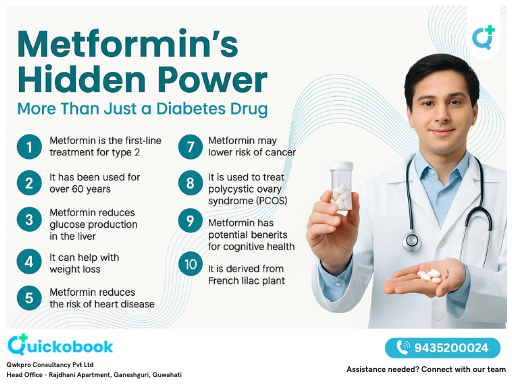Introduction to Metformin Benefits and Uses
Metformin is widely recognized as a leading medication for type 2 diabetes treatment. However, its benefits extend far beyond blood sugar control. From managing PCOS (Polycystic Ovary Syndrome) and fatty liver disease (NAFLD) to reducing cardiovascular risks and aiding weight loss, metformin is becoming a versatile tool in modern medicine. This article explores the many metformin uses, its health benefits, and how it helps improve overall metabolic and hormonal health.
How Metformin Controls Blood Sugar in Type 2 Diabetes — Track Your Progress with Quickobook Book Test
Metformin works primarily by lowering glucose production in the liver, making it the first-choice drug for type 2 diabetes management. It improves insulin sensitivity, allowing body cells to absorb glucose more efficiently and lowering blood sugar levels after meals.
Unlike other diabetes medications, metformin does not stimulate insulin secretion, so it rarely causes hypoglycemia. It also helps with modest weight loss, which is crucial since obesity worsens insulin resistance in diabetics.
Monitoring your blood sugar regularly through a Quickobook book test helps you and your doctor assess how well metformin is working for you and adjust treatment if needed.
Metformin for PCOS: Managing Hormonal Imbalances and Insulin Resistance
Many women with PCOS struggle with insulin resistance even if their blood sugar is normal. Metformin improves insulin sensitivity, which helps reduce insulin levels and lowers androgen hormones responsible for symptoms like acne, irregular periods, and excessive hair growth.
By promoting regular ovulation, metformin also increases fertility chances in women with PCOS. It often improves lipid profiles and body weight, making it a valuable off-label treatment for this condition.
Cardiovascular Benefits of Metformin in Diabetes and Prediabetes — Importance of Quickobook Book Test Monitoring
People with diabetes or prediabetes have a higher risk of heart disease. Metformin reduces this risk by improving blood vessel function, lowering LDL cholesterol, and reducing inflammation.
Studies such as the UKPDS demonstrate that metformin significantly cuts the chance of heart attacks and strokes, making it a key player in preventing cardiovascular disease related to metabolic disorders.
Regular cardiovascular risk assessment combined with metabolic monitoring through Quickobook book test can help detect early changes and prevent serious complications.
Metformin and Weight Loss: Supporting Obesity Management
Though not primarily a weight-loss drug, metformin supports gradual and sustained weight reduction, especially in overweight or insulin-resistant individuals. It suppresses appetite and influences gut bacteria to reduce calorie absorption.
Managing weight effectively with metformin helps lower the risk of diabetes, fatty liver, and other metabolic diseases.
Treating Fatty Liver Disease (NAFLD) with Metformin
Non-alcoholic fatty liver disease (NAFLD) often coexists with obesity and diabetes. Metformin improves liver health by reducing fat buildup and normalizing liver enzymes through better insulin sensitivity and weight management.
Although not officially approved for NAFLD, many patients experience benefits as part of their metabolic treatment.
Preventing Diabetes: Metformin Use in Prediabetes — Track Your Status with Quickobook Book Test
Metformin is commonly prescribed to individuals with prediabetes or impaired glucose tolerance. It helps delay or prevent the onset of type 2 diabetes by lowering liver glucose output and enhancing insulin action.
The Diabetes Prevention Program showed metformin reduces diabetes risk by about 31% in high-risk groups, making it a powerful preventive medication.
Regular testing via Quickobook book test allows early detection and effective management of prediabetes.
Metformin’s Potential Role in Cancer Prevention
Emerging research indicates that metformin may lower the risk of certain cancers, including breast, colon, and prostate cancer. Its effects on cellular metabolism and insulin regulation slow cancer cell growth, making it a promising adjunct in cancer prevention, especially for diabetic patients.
Enhancing Fertility in Women Using Metformin
For women facing infertility due to PCOS or insulin resistance, metformin helps restore hormonal balance and regular ovulation, increasing chances of pregnancy. It is often combined with fertility drugs like clomiphene to improve success rates.
Metformin for Hormonal Acne and Skin Health
Hormonal acne linked to high insulin and androgen levels improves with metformin treatment, especially in women with PCOS. By reducing these hormones, metformin helps decrease oil production and inflammation, leading to clearer skin.
Immune Modulation and Anti-Inflammatory Effects of Metformin
Metformin reduces chronic low-grade inflammation linked to diseases such as arthritis, atherosclerosis, and metabolic syndrome by activating AMPK and suppressing inflammatory pathways, contributing to overall disease management.
Metformin’s Impact on Mental Health and Cognitive Function
Studies suggest metformin may improve cognitive function and mood in people with insulin resistance or diabetes by enhancing brain glucose use and reducing neuroinflammation. It may also delay the progression of Alzheimer’s disease.
Hormonal Balance and Fertility Benefits in Men
Men with metabolic syndrome or insulin resistance may experience improved testosterone levels, fertility, and libido with metformin, along with reduced estrogen produced by fat tissue.
Longevity and Anti-Aging Potential of Metformin
By mimicking calorie restriction effects, metformin activates pathways linked to longevity such as AMPK and mTOR inhibition. Clinical trials like TAME are investigating its potential to extend healthy lifespan and reduce age-related diseases.
Metformin for Sleep Apnea via Weight and Metabolic Control
By aiding weight loss and improving metabolism, metformin may reduce the severity of obstructive sleep apnea, improving energy levels and sleep quality in affected patients.
Improving Lipid Profiles and Reducing Cholesterol with Metformin
Metformin modestly lowers total cholesterol, LDL, and triglycerides while increasing HDL in some patients, contributing to better cardiovascular health in metabolic disorders.
READ ALSO: 10 Surprising Facts About Calpol You Probably Didn’t Know
Enhanced Exercise Tolerance with Metformin Use
Metformin improves mitochondrial function and glucose metabolism, helping patients with diabetes or obesity increase exercise capacity and stamina, which further supports weight loss and metabolic health.
Use of Metformin in Gestational Diabetes Management
Metformin is increasingly used to manage gestational diabetes (GDM), helping control blood sugar without the need for insulin injections in mild to moderate cases, with good safety profiles for mother and baby.
Managing Metabolic Syndrome with Metformin
Metformin targets multiple components of metabolic syndrome—high blood pressure, excess belly fat, abnormal cholesterol, and blood sugar—improving insulin sensitivity and reducing cardiovascular risk.
Conclusion: Why Metformin Is More Than Just a Diabetes Drug
Metformin’s benefits go well beyond treating type 2 diabetes. Its wide-ranging effects on PCOS, fertility, cardiovascular health, weight management, cancer prevention, and more make it a powerful, multi-purpose medication. Ongoing research continues to uncover new uses, confirming metformin as one of modern medicine’s most valuable therapies for chronic diseases.
Using Quickobook book test services regularly can help you monitor and manage these health conditions effectively under medical guidance.










Comments (0)
No comments yet. Be the first to share your thoughts!
Leave a Comment